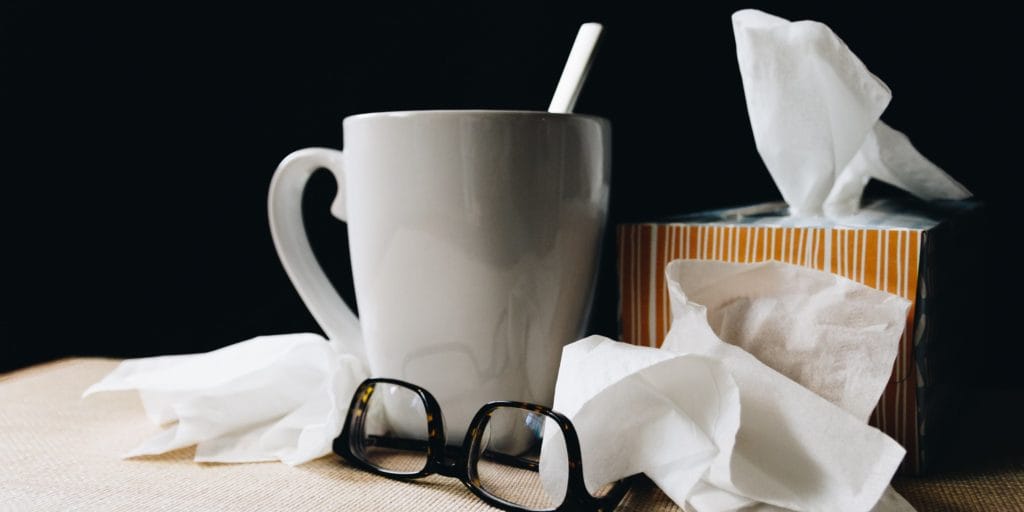Grippe (Influenza)
What is the difference between flu and flu-like infections?
In everyday life, the term flu is often used in connection with colds or flu-like infections. When someone at work says they have caught the flu, they are probably referring to a severe cold or flu-like infection. Various viruses can cause the unpleasant symptoms of a scratchy throat, runny and blocked nose, cough and headache etc.. Unfortunately, viruses are very changeable and can trick our immune system, which is why we get flu-like infections several times a year. However, the symptoms usually disappear within a few days. The situation is different with “real” flu or influenza. Influenza is a serious illness, especially for older or immunocompromised people. It is caused by influenza viruses. Every year in the winter months it unfortunately attracts our attention again.

Influenza flu
Caused by influenza viruses
Influenza can be a disaster in hospitals and nursing homes, for example! But it can also put healthy young people completely out of action for a few days. The symptoms sometimes resemble a severe cold and can therefore be confused with many other acute respiratory illnesses. However, it is characterised by the often very sudden onset of the full-blown illness, whereas harmless flu-like infections tend to develop slowly. So if your state of health changes from being perfectly healthy to feeling very ill within a few hours, you should think of influenza.

Typical symptoms of influenza
In addition to the “cold symptoms”, the typical symptoms of influenza include a pronounced feeling of illness throughout the body with severe tiredness and fatigue, severe headaches and aching limbs and high fever with possible shaking chills, as well as loss of appetite. Nausea, vomiting and diarrhoea are also possible. The symptoms appear after an incubation period of a few hours to days, but the viruses can be transmitted to others as early as two days before the first symptoms appear. The symptoms usually last for 7 to 14 days. However, a general feeling of weakness and loss of appetite can persist for several weeks after this.
Are complications to be expected?
Unfortunately, complications are not uncommon with influenza flu. Influenza viruses spread to the lungs, heart and brain much more often than other viruses. Complications can be caused by the influenza viruses themselves. Or the weakened body may also succumb to a bacterial infection (secondary infection). The most common complications are respiratory infections such as bronchitis or pneumonia, as well as sinusitis and otitis media. Other complications are rarer, but often very serious. E.g. pleurisy, meningitis, encephalitis, myocarditis and others. In principle, complications can occur in all patients, but people over the age of 65, people with chronic illnesses, people with weakened immune defences, people who are very overweight, pregnant women and babies are particularly at risk.
How can our body defend itself against viruses?
When the immune system is running at full speed
Coughing, sneezing, blowing our nose … Whether on public transport, in the office or at school and when shopping; we come into contact with various pathogens, such as flu viruses, everywhere. They seem to be lurking everywhere, especially in the cold season. Our bodies are particularly challenged in the winter months, as the large temperature differences between outside and inside cause them to struggle and the mucous membranes dry out from the heating air. In addition, flu is always around at the beginning of the year. Our immune system is running at full capacity these days and is grateful when we support it! But how?

Supporting the immune system
A varied diet with plenty of fresh fruit and vegetables (organic quality) is certainly an important aspect, but it does pose a few challenges in winter, especially if you want to eat mainly seasonal produce. We all know that plenty of exercise in the fresh air, naturally in weather-appropriate, warm clothing, is also good for the body. It may take some effort, especially in cold, wet and grey weather. But it’s worth it. Getting enough sleep and as little stress as possible also helps the body to do its important work in defending itself against a wide range of germs. This is also not always easy to do, but is highly recommended. On the other hand, it is child’s play and effective to wash your hands regularly. This is particularly important after spending time in places with lots of people, e.g. after using public transport, after shopping, etc.

Support the immune system with vital substances
With today’s food and our modern lifestyle, it is almost impossible to consume all the important vital substances that a properly functioning immune system depends on. In such cases, e.g. during the winter season, our immune system may be dependent on the intake of food supplements containing natural vital substances.
How do you treat flu?
Combat symptoms
If you get influenza despite the precautions mentioned above (strengthening the immune system, hygiene measures), it is very important to get the necessary rest, i.e. to stay in bed for a few days. If you feel unwell, you will almost certainly stick to it voluntarily anyway. If you force yourself out of bed too early, you are more at risk of complications. It is also important to drink enough fluids so that, among other things, mucus can liquefy and be coughed up more easily and the loss of fluids due to the fever can be compensated for. However, you should not force yourself to eat, especially in the first few days. Eat only easily digestible food. Perhaps you would like a smoothie (preferably with lots of vitamin C)? Or a soup? Especially if you feel dizzy when you get up, this will provide you with the salt you need.

Medication and household remedies
Depending on the symptoms that bother you the most, they will be alleviated. For example, fever and pain-reducing medication, cough suppressants (for dry coughs), moisturising and/or decongestant nasal sprays, etc. are used. Home remedies such as inhalation (e.g. with camomile) or throat or chest compresses (e.g. with potatoes) can also alleviate the unpleasant symptoms. Teas are also good for hydration and also have healing properties (e.g. sage tea with honey and lemon juice). Gargling cleanses the mucous membranes in the throat of plaque and can counteract inflammation, depending on what you add (e.g. with salt water: half a teaspoon of salt to a glass of warm water). Try soothing and supportive compresses (e.g. fever-reducing calf compresses, throat compresses with lemon or curd, ear compresses with onions, etc.). As influenza is extremely contagious (droplet infection), hygiene measures should be increased if there is a case of influenza in the family (an appropriate protective mask could be considered for family carers).
Insider tip: Artemisia annua
If you are already showing the first symptoms of illness, there is an effective insider tip: Artemisia annua. There are more than 300 species of Artemisia (mugwort plant) in temperate climates. The special variety Artemisia annua has been known in Chinese folk medicine for 2000 years and has recently gained attention as a malaria remedy. However, this herb can also be used to treat flu-like infections and influenza.
